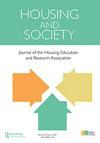“Get people out of bad situations sooner”: exploring transgender and cisgender veterans’ experiences using permanent supportive housing
Q2 Social Sciences
引用次数: 9
Abstract
ABSTRACT Transgender veterans are more likely than non-transgender (i.e., cisgender) veterans to experience housing instability, and they may experience unique challenges in accessing permanent supportive housing (PSH). The objective of this study was to explore transgender and cisgender veterans’ experiences utilizing PSH through the U.S. Departments of Housing and Urban Development-Veterans Affairs Supportive Housing (HUD-VASH) program. Between February and May 2018, 48 veterans (14 cisgender women, 17 cisgender men, 17 transgender individuals) completed an audio-recorded, semi-structured telephone interviews; all transgender individuals self-identified as transgender women. We used rapid identification of themes from audio recordings (RITA) to analyze the data. Half of the participants had been in HUD-VASH one to three years. Most respondents cited their case manager as a key facilitator in successfully becoming housed and identified lack of understanding the HUD-VASH admission processes and wait times as common barriers to housing. Other challenges included veterans’ inability to receive services until they were homeless and landlords’ reluctance to rent to veterans with histories of substance use. Transgender women veterans conveyed unique challenges related to sex-specific shelter experiences and incongruence of identification cards and gender expression.“让人们更快地摆脱困境”:探索跨性别和顺性别退伍军人使用永久性支持性住房的经历
摘要跨性别退伍军人比非跨性别(即顺性别)退伍军人更有可能经历住房不稳定,他们在获得永久性支持性住房(PSH)方面可能会遇到独特的挑战。本研究的目的是通过美国住房和城市发展部退伍军人事务支持性住房(HUD-VASH)计划,探索跨性别和顺性别退伍军人使用PSH的经历。2018年2月至5月,48名退伍军人(14名顺性别女性、17名顺性别男性、17名跨性别者)完成了一次录音的半结构化电话采访;所有自我认定为跨性别女性的跨性别者。我们使用从录音中快速识别主题(RITA)来分析数据。一半的参与者在HUD-VASH工作了一到三年。大多数受访者认为,他们的案例经理是成功获得住房的关键推动者,并认为缺乏对HUD-VASH入院流程和等待时间的了解是住房的常见障碍。其他挑战包括退伍军人在无家可归之前无法获得服务,以及房东不愿将其出租给有药物使用史的退伍军人。跨性别女退伍军人传达了与性别庇护所经历以及身份证和性别表达不一致有关的独特挑战。
本文章由计算机程序翻译,如有差异,请以英文原文为准。
求助全文
约1分钟内获得全文
求助全文
来源期刊

Housing and Society
Social Sciences-Urban Studies
CiteScore
2.30
自引率
0.00%
发文量
10
期刊介绍:
Housing and Society is the journal of the Housing Education and Research Association (HERA). The journal supports the mission of HERA by providing for the dissemination of research and other scholarly work. Submissions from a broad range of perspectives are encouraged. Topics in housing include: policy, design, social aspects, gerontology, behavioral aspects, energy/environment, equipment, interiors, economics, theory/model development, education, and program development or evaluation. The journal welcomes the submission of original research articles, notes and commentaries. Notes are shorter manuscripts presenting succinct information on housing related to one of the following categories: - Research: exploratory or not heavily theory-based or statistically analyzed - Academic: innovative teaching ideas - Program: development, implementation, and/or evaluation of Cooperative Extension or other housing programming efforts - Policy: examination of policy impact, comparative analysis, and/or need to achieve housing goals - Reviews: books, documentaries, etc.
 求助内容:
求助内容: 应助结果提醒方式:
应助结果提醒方式:


